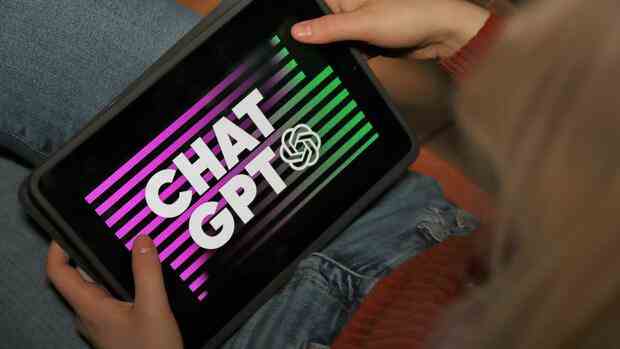Every second panelist, almost every moderator starts the same: I once asked ChatGPT what I should say. What was once original has long since become a worn-out routine. ChatGPT seems to be revitalizing our world, because artificial intelligence can now describe it. We humans were able to do that before, but because it was always like that, we’ve obviously gotten bored with ourselves. AI is suddenly making creativity exciting again.
If there’s a clear trend in tech, it’s going to be evident here at South by Southwest, one of the world’s largest digital conferences, in Austin, Texas. Two years ago it was the blockchain, in 2022 you could not save yourself from NFTs and the metaverse was supposedly about to replace the real world completely at some point. And this year, generative AI is experiencing its triumph in the rooms of the congress center. ChatGPT gets asked about everything and applauds like a toddler who can say “mommy”.
There is one guest who has every right to ask a question to ChatGPT, but doesn’t do it (again, the moderator has already done that). Greg Brockman is one of the founders of OpenAI and inventor of the AI application that is now redefining the world for us. Brockman soberly analyzes the history and potential future, the opportunities and risks of ChatGPT. And he says a very central sentence that explains the tool’s wave of success: Every business model is a language model. In other words, everything in the world is based on communication. And AI can suddenly do that as well as we can.
But is that really the case? These language models are trained with texts from the Internet. They analyze what is described in order to deduce what still needs to be described. All communicative future is derived from communicative past.
It doesn’t matter, because you can learn from history. However, it remains to be seen whether this is also the case for language models. A self-reinforcing mechanism is at work here that may eventually implode creative progress.
Miriam Meckel is a German journalist and entrepreneur. She is co-founder and CEO of ada Learning GmbH. She also teaches as a professor for communication management at the University of St. Gallen.
(Photo: Klawe Rzeczy)
Fed with historical data, the AI spits out more and more forecasts of text sequence probabilities, which are nothing more than an ever new recombination of what already exists. At the same time, people sometimes produce quite original texts, pieces of music, poems, which in turn find their way into the growing text memory of human history. Innovation and recombination complement each other. Forever?
>> Read also: How AI and Sam Altman will change your life
An international research team has calculated that the pool of new high-quality text data for AI will be exhausted by 2026. After that, she trains more and more with texts that she created herself. This is text incest and in this case it is not a moral but an intellectual problem.
Miriam Meckel: An intellectually boring world is imminent
The AI squeezes all communication through a highly efficient mixer. What she produces is in turn fed into the world knowledge of the internet – a self-reinforcing mechanism in which the remix grows and originality shrinks. At some point, however, the tipping point will be reached. That is the dynamic of a crisis of meaning in the data society, and it is reminiscent of history.
How structured products in the financial markets contributed to the crash and crisis from 2008, generative AI could be heading for a melting point of original communication. The AI creates complex structured derivatives of thinking – in so many derivations that we can hardly recognize the original. New things put together from used items are mixed and processed into new remixes until everything becomes a thought smoothie.
>> Read also: These six industries could benefit enormously from AI
This will be the time of continuous clichés. Automated communication is becoming more and more important, AI bots reply to e-mails, which in turn were written by AI bots. A secondary market of automated communication is emerging that will soon outstrip the primary market of human communication—an intellectually dull world of mixed minds.
Actually, according to Greg Brockman at SXSW, ChatGPT should help to solve our creative blocks and help us with new ideas. The tool can actually be very helpful for this. In order to understand the effects of new technologies, according to Brockman, one must above all understand people. According to Hannah Arendt, he has the ability to do the unexpected – as long as it is not rationalized away by convenience. Let’s hope that we can still surprise ourselves historically.
In this column, Miriam Meckel writes fortnightly about ideas, innovations and interpretations that make progress and a better life possible. Because what the caterpillar calls the end of the world, the rest of the world calls a butterfly. ada-magazin.com
More: Interview with Peter Thiel: “Google is completely in panic mode”
